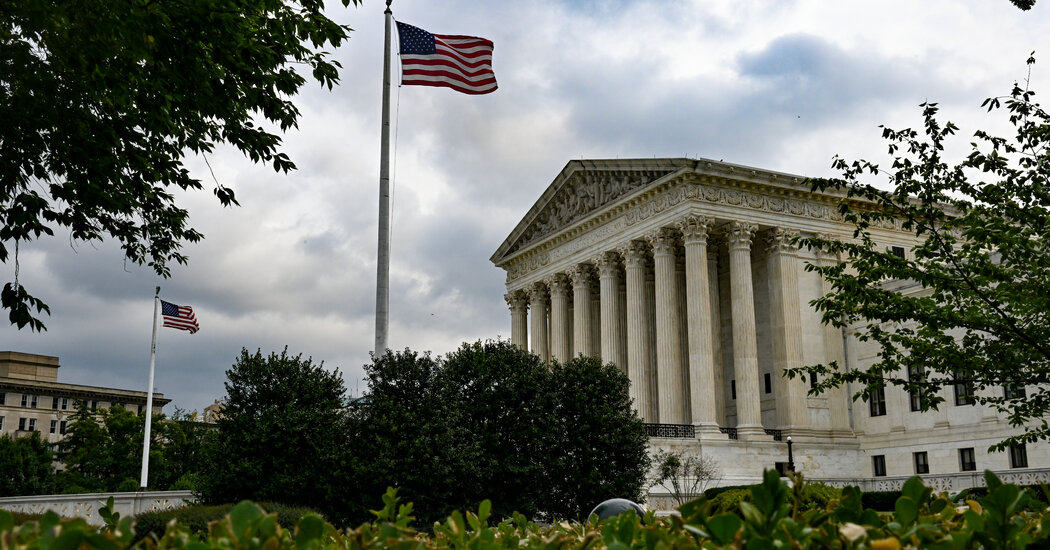The Supreme Court agreed on Friday agreed to decide whether Florida and Texas may prohibit large social media companies from removing posts based on the views they express, setting the stage for a major ruling on how the First Amendment applies to powerful tech platforms.
The laws’ supporters argue that the measures are needed to combat what they called Silicon Valley censorship, saying large platforms had removed posts expressing conservative views on issues like the coronavirus pandemic and claims of election fraud. In particular, they objected to the decisions of some platforms to bar President Donald J. Trump after the Jan. 6, 2021, attack on the Capitol.
Two trade groups, NetChoice and the Computer & Communications Industry Association, had challenged the laws, saying the First Amendment prevents the government from telling private companies whether and how to disseminate speech.
The court’s decision to hear the cases was unsurprising. In each case, both sides had urged the justices to do so, citing a clear conflict between two federal appeals courts. One ruled against the Florida law, the other in favor of the one in Texas.
The approaches of the two states were similar but not identical, Judge Andrew S. Oldham wrote in a decision upholding the Texas law. “To generalize just a bit,” the Florida law “prohibits all censorship of some speakers,” while the Texas law “prohibits some censorship of all speakers” when based on the views they express.
In a statement issued when he signed the Florida bill, Gov. Ron DeSantis, now a Republican presidential candidate, said the point of the law was to promote conservative viewpoints. “If Big Tech censors enforce rules inconsistently, to discriminate in favor of the dominant Silicon Valley ideology, they will now be held accountable,” he said.
The Texas law applies to social media platforms with more than 50 million active monthly users, including Facebook, YouTube and X, the site formerly known as Twitter. It does not appear to reach smaller platforms that appeal to conservatives, and it does not cover sites that are devoted to news, sports, entertainment and other information that their users do not primarily generate.
The sites in question are largely barred from removing posts based on the viewpoints they express, with exceptions for the sexual exploitation of children, incitement of criminal activity and some threats of violence.
A unanimous three-judge panel of the U.S. Court of Appeals for the 11th Circuit, in Atlanta, last year largely upheld a preliminary injunction against Florida’s law.
“Social media platforms exercise editorial judgment that is inherently expressive,” Judge Kevin C. Newsom wrote for the panel. “When platforms choose to remove users or posts, deprioritize content in viewers’ feeds or search results or sanction breaches of their community standards, they engage in First Amendment-protected activity.”
A few months later, a divided three-judge panel of the Fifth Circuit, in New Orleans, reversed a lower court’s order blocking the Texas law.
“Today we reject the idea that corporations have a freewheeling First Amendment right to censor what people say,” Judge Oldham wrote.
He added: “The platforms are not newspapers. Their censorship is not speech.”
The Supreme Court had already had an encounter with the Texas case, temporarily blocking its law last year while an appeal moved forward. The vote was 5 to 4, with an unusual coalition in dissent.
The court’s three most conservative members — Justices Samuel A. Alito Jr., Clarence Thomas and Neil M. Gorsuch — filed an opinion saying they would have left the law in place and that the issues were so novel and significant that the Supreme Court would have to consider them at some point.
“Social media platforms have transformed the way people communicate with each other and obtain news,” Justice Alito wrote in the dissent. “At issue is a groundbreaking Texas law that addresses the power of dominant social media corporations to shape public discussion of the important issues of the day.”
Justice Alito added that he was skeptical of the argument that the social media companies have editorial discretion protected by the First Amendment like that enjoyed by newspapers and other traditional publishers.
“It is not at all obvious,” he wrote, “how our existing precedents, which predate the age of the internet, should apply to large social media companies.”
Justice Elena Kagan, a liberal, voted with the dissenters but did not adopt their reasoning or give reasons of her own.
The First Amendment generally prohibits government restrictions on speech based on content and viewpoint but allows private companies to say and convey what they wish.
In a recent Supreme Court brief, lawyers for Texas said the challenged law does not affect the platforms’ free speech rights because “no reasonable viewer could possibly attribute what a user says to the platforms themselves.” The brief added: “Given the platforms’ virtually unlimited capacity to carry content, requiring them to provide users equal access regardless of viewpoint will do nothing to crowd out the platforms’ own speech.”
In an earlier brief, the state’s lawyers wrote that “the platforms are the 21st century descendants of telegraph and telephone companies: that is, traditional common carriers.” That means, they wrote, that the companies must generally accept all customers.
The Biden administration filed a brief in August urging the justices to hear the cases — Moody v. NetChoice, No. 22-277, and NetChoice v. Paxton, No. 22-555 — and to rule in the companies’ favor.
“When a social-media platform selects, edits and arranges third-party speech for presentation to the public, it engages in activity protected by the First Amendment,” Solicitor General Elizabeth B. Prelogar wrote for the administration, adding that “the act of culling and curating the content that users see is inherently expressive, even if the speech that is collected is almost wholly provided by users.”
[ad_2]
Source link


